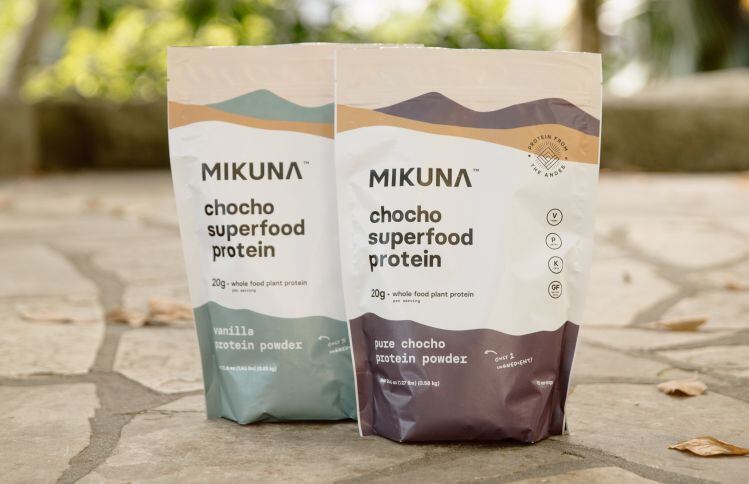Kriese - a former marketer at Impossible Foods who became CEO at Mikuna in June 2021 - started working with the brand’s founder, athlete and fifth generation farmer from Ecuador, Ricky Echanique, in an advisory capacity in 2020, not the ideal time to launch a new consumer brand, she observed.
“In September, October of 2020, nobody was wandering around grocery stores wondering what was new," Kriese told FoodNavigator-USA.
"So we focused on direct-to-consumer and it was a case of let’s just see if there's traction, and we had these really strong signals out of the gate with a subscription attach rate which is just incredible for a brand new entrant in a very crowded category.”
#1 plant protein supplement at Erewhon
By February of 2021, she said, “We were we were approached by [SoCal-based upmarket natural food chain] Erewhon, not the other way around, which really doesn’t happen… I still have friends who have brands that asked me how the heck we did that.
“We've been in all Erewhon locations since March 2021 and as of the end of January we are the number one plant protein supplement in the category, with the highest volume and highest unit velocity as well as highest sales. We represent 34% of the category and we are now the official plant protein of Erewhon, so if you go to any of their fancy juice bars in store, our co-branded Regenerada smoothies are on the menu.”
The performance of Mikuna, which grew 79% YoY in Q2, 2021; 197% in Q3, and 226% in Q4, has opened doors with other retailers, said Kriese, who has just secured listings at a high-profile retailer rom the beginning of March, “and then there are some other really big retailer names that are going to come on the scene very soon.”

‘A whole food product that’s naturally high in protein, fiber, and healthy fats’
So what’s the attraction of Chocho for consumers?
The nutritional profile of Chocho powder, which Mikuna sells as a whole food ingredient in a pouch with no additional plant proteins or other ingredients, is particularly compelling, with each 39g serving containing 20g protein, 8g fiber, 140mg calcium (10%DV), 2mg iron (10%DV), 2mg zinc (20%DV), and 3mg vitamin E (20%DV), said Kriese, who notes that Mikuna removes purported ‘anti-nutrients’ including lectin which she claims can cause digestive distress in some people.
“Chocho has a nutritional profile that is superior to the majority of the aisle and doesn’t require a Prop 65 label here in California." But more generally, she said, "People want plant proteins that are easier to work with, without off notes you’ve got to counterbalance, and we’re selling a whole food product that’s naturally high in protein, fiber, and healthy fats.”

Not all lupin varieties are the same
While lupin (or lupini) seeds are starting to appear in some trendy snack brands in the US such as BRAMi and Lupii, not all varieties are the same, stressed Kriese.
“The Andean lupin [L. mutabilis], which is locally known as Chocho [pronounced cho-cho], grows at these incredibly high altitudes over winter with very little rainfall, and it fixes nitrogen and regenerates the soil. It’s very cold, but it doesn't freeze, and over thousands of years, the plant has adapted to produce this really strong nutritional profile that varies greatly from its European and Australian cousins.
"In some harvests, the protein content is as high as 60% [whereas other lupin varieties range from around 33-42%] and on average it’s around 54%. It’s also more than 20% oil that’s second in quality only to olive oil, so you’ve got this moist, dense product that also has an outstanding branched chain amino acid profile [one of the things that attracted founder Ricky Echanique, who as an athlete was looking for specific attributes from his protein, she said].”
From CPG products to b2b ingredients
The longer-term vision for Chocho and Mikuna [which roughly means nourishing the body through food in Kichwa, a Quechuan language still spoken in parts of the Andes] will stretch beyond Mikuna branded CPG products, said Kriese, although establishing the brand in retailers’ protein powder sets is the current priority.
“Our current product set is protein supplements,” said Kriese. “But we may have some other products that we'll announce coming out this year. I can't get into too much detail, but you can imagine a functional nutrition product roadmap, so the brand will always be about premium functional nutrition.”
Asked about opportunities to supply other companies with milled Chocho as an ingredient, she said: “We already work with some folks at an ingredient level, and as we expand our supply chain and move into newer facilities, the range of product offerings will greatly increase, so we look forward to continuing both foodservice and industrial food relationships in that capacity.”
‘What can be done to scale this superfood and bring meaningful income to farmers?’
Founder Ricky Echanique – who is based in Santa Barbara, CA, but grew up in Ecuador in a farming family – has established relationships with growers in Ecuador, where the crop is processed before it is shipped in bulk to the US and packaged, said Kriese.
“We have several patent applications already filed on the process, as our work on debittering and milling is proprietary, but [stepping back, she said, the question is] what can be done to scale this superfood and bring meaningful income to farmers? And how do we do it in a way that is even more sustainable, with minimal energy requirements? All of the things that that matter to a company that has regenerative faming at its core.”
Asked about the capacity for Chocho should sales take off in the way Kriese hopes, she said: “We have the availability to be able to support a business on a 10-year horizon. Chocho has been kind of under the radar but I think we have a real opportunity and a real head start [to take the lead should this ingredient take off], as we have the team and infrastructure to have quite a head start in the region to support long range growth of the business.”
Early adopters: ‘We've had a lot of inbound interest from athletes’
As for early adopters of the Mikuna products in the US [there are three SKUs: pure Chocho, Vanilla, Cacao], she said: “We've had a lot of inbound interest from athletes and many of our investors are former or current professional athletes, so [professional surfer] Taylor Knox was one of our earliest investors and brand ambassadors, who loved the clean, neutral flavor profile, high fiber, and zero net carbs.”
To date, the company has not taken on any institutional capital, with funding coming from individual investors such as Knox who are fans of the brand, she said. “We'll have some funding announcements very soon.”
Interested in plant-based proteins?

The so-called ‘alternative’ protein landscape remains dominated by plants. But the formulation toolbox is expanding rapidly, with the likes of pea and fava beans set to compete with everything from ‘animal-free’ dairy and collagen proteins; to fungi-, algae-, bacteria- and yeast-derived proteins made in fermentation tanks; to a new wave of proteins made via ‘cell-free’ microbial production platforms – as well as real animal cells - over the next decade.
So where is the plant-based protein market going, what’s new in the toolbox (from Nepra’s work on hemp to TerViva’s work on Pongamia and EverGrain's work on barley protein), and are new plant-based options always going to be an easier sell for consumers than some of the more exotic new offerings emerging from Silicon Valley?
Learn more at FoodNavigator-USA's webinar, Plant-based protein in focus: From Pongamia to chickpeas, airing March 24 at 11am Central, as part of our Positive Nutrition virtual series.
Speakers for this session include:
- Gregory Belt, Founder and CEO, EverGrain Ingredients
- Chadwick White, CTO, Nepra Foods
- Dr David Welch, Co-Founder & Chief Scientific Officer, Synthesis Capital
- Dr James Astwood, CTO, TerViva
- Justin Shimek CEO, Mattson
- Panchali Chakraborty, Technical Director, Savory & Snacks, Givaudan
- Roi Wurgaft, Owner, Wurgaft Consulting & Development
- Dr Aurelie Mauray, Market Manager Plant Proteins Americas, Roquette

